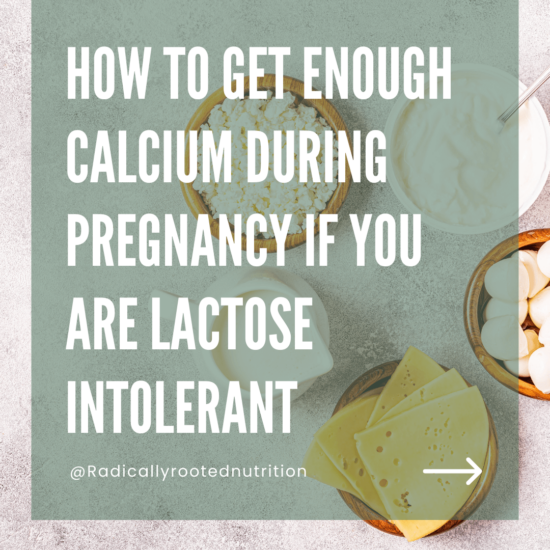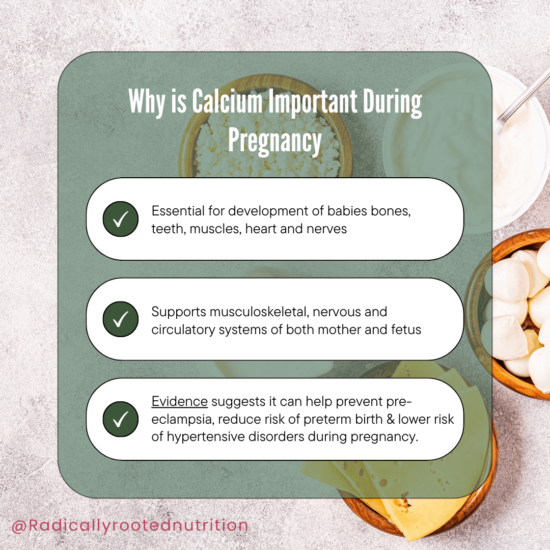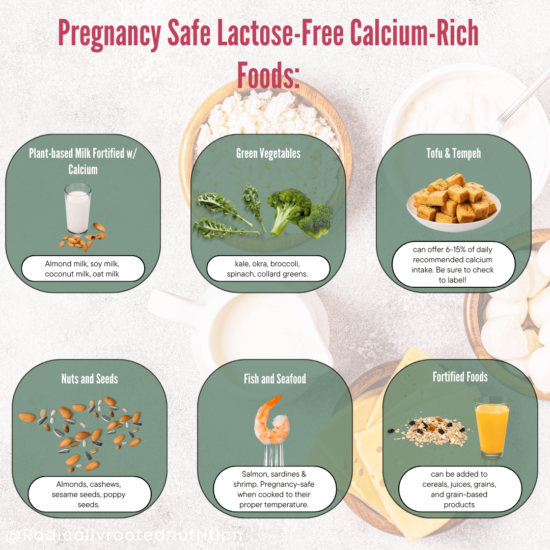Getting Enough Calcium While Pregnant with Lactose Intolerance
The other day I was speaking with a pregnant client who is lactose intolerant. Initially, there was no concern but when we started to speak about her daily intake, I had some concerns that she wasn’t meeting her calcium and vitamin D needs. It made me wonder how many women are in the same situation. Calcium and vitamin D go hand in hand; both are important nutrients during pregnancy and breastfeeding. If you are lactose intolerant, it is crucial to ensure that you are incorporating these nutrients into your daily diet. Let’s talk about how we can ensure we get enough calcium while pregnant with lactose intolerance.

Why is Calcium Important During Pregnancy?
Calcium is crucial during pregnancy for several reasons. It is essential for the development of the baby’s bones, teeth, muscles, heart, and nerves. Additionally, calcium supports the musculoskeletal, nervous, and circulatory systems of both the mother and the fetus. If a pregnant woman doesn’t consume enough calcium, her stores will become depleted, putting her at risk for bone loss.
Evidence suggests that calcium supplementation can help prevent pre-eclampsia, reduce the risk of preterm birth, and lower the risk of hypertensive disorders during pregnancy. Approximately 30 g of calcium is accumulated during pregnancy, almost all of it in the fetal skeleton (25 g). The remainder is stored in the maternal skeleton, held in reserve for the calcium demands of lactation.
During pregnancy, it’s recommended that women aged 19-30 get at least 1,000 mg of calcium per day, while those aged 31 to 50 should aim for 1,300 mg. Adequate calcium intake is vital to support the health of both the mother and the developing baby.

Pregnancy Safe Lactose-Free Calcium-Rich Foods:
- Plant-based milk fortified with calcium: Almond milk, soy milk, coconut milk, oat milk.
- Green vegetables: kale, okra, broccoli, spinach, collard greens.
- Tofu and Tempeh: can offer 6-15% of daily recommended calcium intake. Be sure to check to label!
- Nuts and Seeds: almonds, cashews, sesame seeds, poppy seeds. Almonds have the highest level of calcium (28g per serving) compared to other nuts.
- Fish and Seafood: salmon, sardines and shrimp are all great sources of calcium AND pregnancy-safe when cooked to their proper temperature.
- Fortified Foods: can be added to cereals, juices, grains, and grain-based products.
What About Vitamin D?
Vitamin D is just as important as calcium during pregnancy, especially for women with lactose intolerance, as it aids in the absorption of calcium. especially during the second half of pregnancy. Therefore, for women with lactose intolerance, it’s recommended to focus on vitamin D in addition to calcium intake to support moms’ health and baby’s development.
Pregnancy-Friendly Lactose Free Calcium-Rich Meal Plan:
Breakfast:
- Smoothie made with fortified almond milk, spinach, banana, and chia seeds.
- Whole grain toast with almond butter and sliced strawberries.
Snack:
- Greek yogurt alternative made from coconut or almond milk, topped with sliced almonds and a drizzle of honey.
Lunch:
- Quinoa salad with mixed vegetables (such as bell peppers, cucumber, and cherry tomatoes) topped with grilled tofu and a tahini dressing.
- Side of steamed broccoli sprinkled with sesame seeds.
Snack:
- Hummus, carrots and whole grain crackers
Dinner:
- Baked salmon seasoned with herbs and lemon juice.
- Quinoa pilaf with sautéed kale, mushrooms, and diced bell peppers.
- Steamed asparagus spears on the side.
Dessert:
- Chia seed pudding made with fortified coconut milk and topped with sliced banana.

Bottom Line
If you are lactose intolerant and pregnant or plan to be pregnant soon, you must focus on incorporating non-dairy calcium-rich foods into your diet. If you are struggling to find things to eat or unsure if you are getting enough calcium and vitamin D, reach out to a Radically Rooted Dietitian and we would be happy to help!



